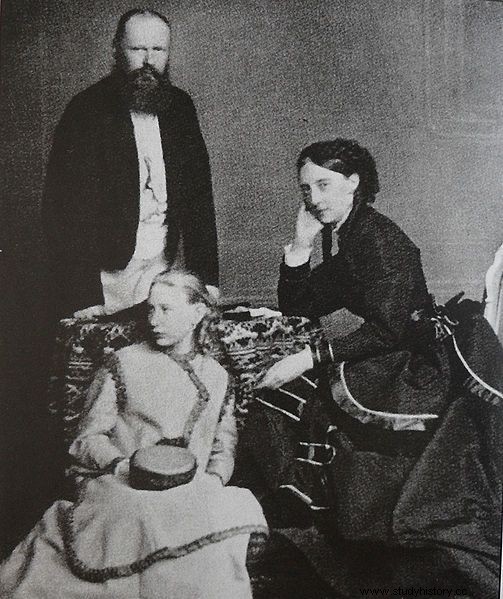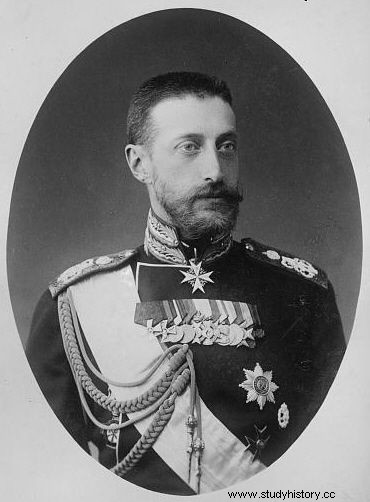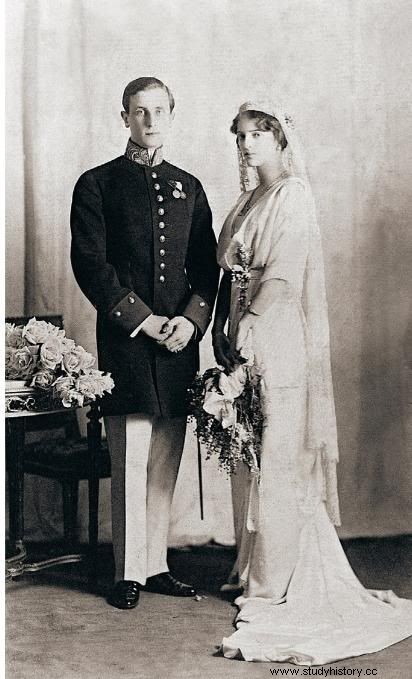In the 19th and early 20th centuries, homosexuals from European ruling families were forced into marriage. Admittedly, wives did not attract their husbands, but more important than love was the begetting of children and the continuation of the dynasty.
The reason for this matrimonial policy was a different perception of homosexuality than today. Gender attraction was then treated as ... a prank of youth or an addiction that had to be eliminated. Young men's families ignored their needs. As for the princes' brides, they were not informed about the orientation of their future husbands. When the truth was revealed during the marriage, the women had to grit their teeth and make a good face to play badly, in accordance with prevailing customs.
Wives suffer in silence
One of the victims of the arranged marriage was Olga (1822-1891), daughter of Nicholas I, who in 1846 married Prince Charles, heir to the throne of Württemberg. It soon turned out that the young wife preferred to spend time not in the company of her charming and educated wife, but other gentlemen.
And after his accession to the throne in 1864, King Charles I had already begun to show himself openly with younger men. One of them, an American, was even knighted. When another lover appeared in the monarch's life, the men began wearing identical clothes to emphasize their close relationship. During this time, Queen Olga pretended not to know about her husband's antics and devoted more and more time to charity, thanks to which she remained in the history of Württemberg.

Olga Romanowa with her husband and adopted daughter
A similar fate befell Queen Victoria's granddaughter - Princess Maria Luisa (1872-1956). The young woman married Prince Aribert of the German principality of Anhalt, who proposed to her after just one accidental meeting at the wedding of her cousin Maria Luisa. Probably behind this haste was the fact that the granddaughter of the mighty queen was a tasty morsel on the matrimonial market of Europe.
Maria Luiza and Aribert were married in 1891. Their marriage lasted 9 years, but the relationship was never consummated. The couple only met at mealtimes, and the prince spent time with his servant. In 1900, Aribert and Maria Luisa divorced and returned to London. The woman did not remarry because she considered herself bound by an oath to her first husband.
Deadly sin
Most often, a different sexual orientation became a source of suffering, as was the case with Grand Duke Konstanty (1858–1915), one of Nicholas II's further uncles and a famous poet who wrote under the pseudonym K.R. Even as a teenager, Konstanty, who joined the Navy, fell in love with young and handsome officers. "I am fascinated by masculinity and I love male beauty," and "love for women disgusts me," he confided to his journal.

Even as a teenager, Konstanty fell in love with young and handsome officers
The Grand Duke knew that it was his duty - as a member of the ruling family - to marry a suitable, high-born virgin.
It turned out to be the German princess Elizabeth of Saxe-Altenburg, whom he married in 1884. The couple became parents of nine children, eight of whom reached adulthood. During their 30-plus-year marriage, Konstanty struggled with his homosexuality, which he perceived as a mortal sin. The Grand Duke made promises to himself many times that he would never again find himself in an intimate situation with another man:"I am starting to fight my dirty thoughts and desires," he declared in the journal.
His nature turned out to be stronger and Konstanty started seeing the handsome boys again. The only safety valve for him was the diary, which he carefully hid from his wife until the end of his life.
Exception to rule
Perhaps the only successful marriage of this type was that between Princess Irina, niece of Nicholas II, and Prince Felix Jusupov. The young man was the heir of one of the empire's greatest fortunes - the Caucasian Yusupov estates stretched 200 km along the Caspian Sea, and the palaces scattered across the country remained empty for most of the year, because their owners did not have time to visit each of them.
It would seem that such a wealthy young man is a suitable party for Irina, who, moreover, loved Felix with reciprocity. But the girl's parents were against this relationship, because they heard about Yusupov's love affairs with representatives of both sexes. An interesting fact is that the princess herself persisted in her decision to marry Felix even after he told her about his inclinations.

Irina and Felix Yusupov
To obtain approval for this marriage, the young man turned to the girl's grandmother - Empress Dowager Maria Fedorovna, for whom Irina was a favorite granddaughter. This old lady had great influence in the Romanov family, so Felix had to convince her to himself. During an audience with Irina's grandmother, Feliks complained and declared that he would end immoral behavior. At the end of the meeting, the Dowager Empress was pleased with Yusupov's approach and declared that she would do everything in her power to make the young happy. And she kept her word, because soon Irina and Feliks got married, and a year later they became their daughter's parents. Their marriage turned out to be successful, historical sources do not report any moral scandals in this family .
Bibliography:
- The Grand Duchesses:Daughters &Granddaughters of Russia's Tsars, Beeche A. (eds.). Eurohistory, 2004
- Packard. J. Queen Victoria`s Daughters. St. Martin`s Press, 1998
- Wiernicka V. Secrets of the Russian Tsars. Księży Młyn. 2018
